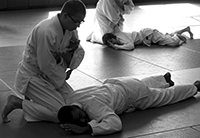 Martial arts liability insurance is a tricky subject. It can be challenging enough finding a reliable insurer for athletic organizations, but in martial arts, your customers are coming in explicitly to learn how to fight; how to throw a punch, and how to take one. Your students are going to be taking falls, learning to block, kick and roll, and you’re going to see everything from sprained ankles to dislocated thumbs.
Martial arts liability insurance is a tricky subject. It can be challenging enough finding a reliable insurer for athletic organizations, but in martial arts, your customers are coming in explicitly to learn how to fight; how to throw a punch, and how to take one. Your students are going to be taking falls, learning to block, kick and roll, and you’re going to see everything from sprained ankles to dislocated thumbs.
Generally when your students sign up, they’re going to be signing a waiver of liability. This will mean that any injuries you can reasonably expect to sustain in class, they’ll be getting it covered under their own medical insurance if necessary, and you’re not going to be getting sued for it. The keyword there is, of course, “reasonably.” This means you might not be protected if, for instance, something can be construed as negligence on your part.
This means that if you’d rather not be seeing a bump in your liability policy on a weekly basis, you’re going to need to do a little base-covering:
- Be reasonable about who you admit to your class (and what you have them do)Martial arts can be a great means of physical rehabilitation, it’s a rewarding pursuit for kids, the elderly, even those dealing with disability. It’s not something to jump into a week after open-heart surgery. Get an idea of every applicant’s health background, and exercise proper judgment in admitting new students. Likewise, be reasonable about what you can expect of each student. A 70 year old woman who’s here becau
se it’s a fun way to stay fit is not who you want sparring against the 250 pound, weight-lifting security guard.
- Practice proper maintenanceLoose floorboards, cluttered space, bad wiring, slippery mats. If the environment that your students are utilizing is not a safe place to be practicing martial arts, it’s unlikely your waivers are going to protect you.
- Be the best teacher you can beThis, of course, should go without saying. You’re teaching the art because you want to pass it on. Poorly trained students, students who have been advanced to the next belt level before they’re ready, students who are not taught proper stretching and warm-up, are subject to injury that may well be found to be the fault of improper training. The martial arts are known as a means of “self-defense” because priority number one is not getting hurt, be it against an opponent or through improper technique.
The key to protection beyond your waivers are professionalism and passion for the art. Insurance is for when the unforeseen happens. The preventable is your job.





